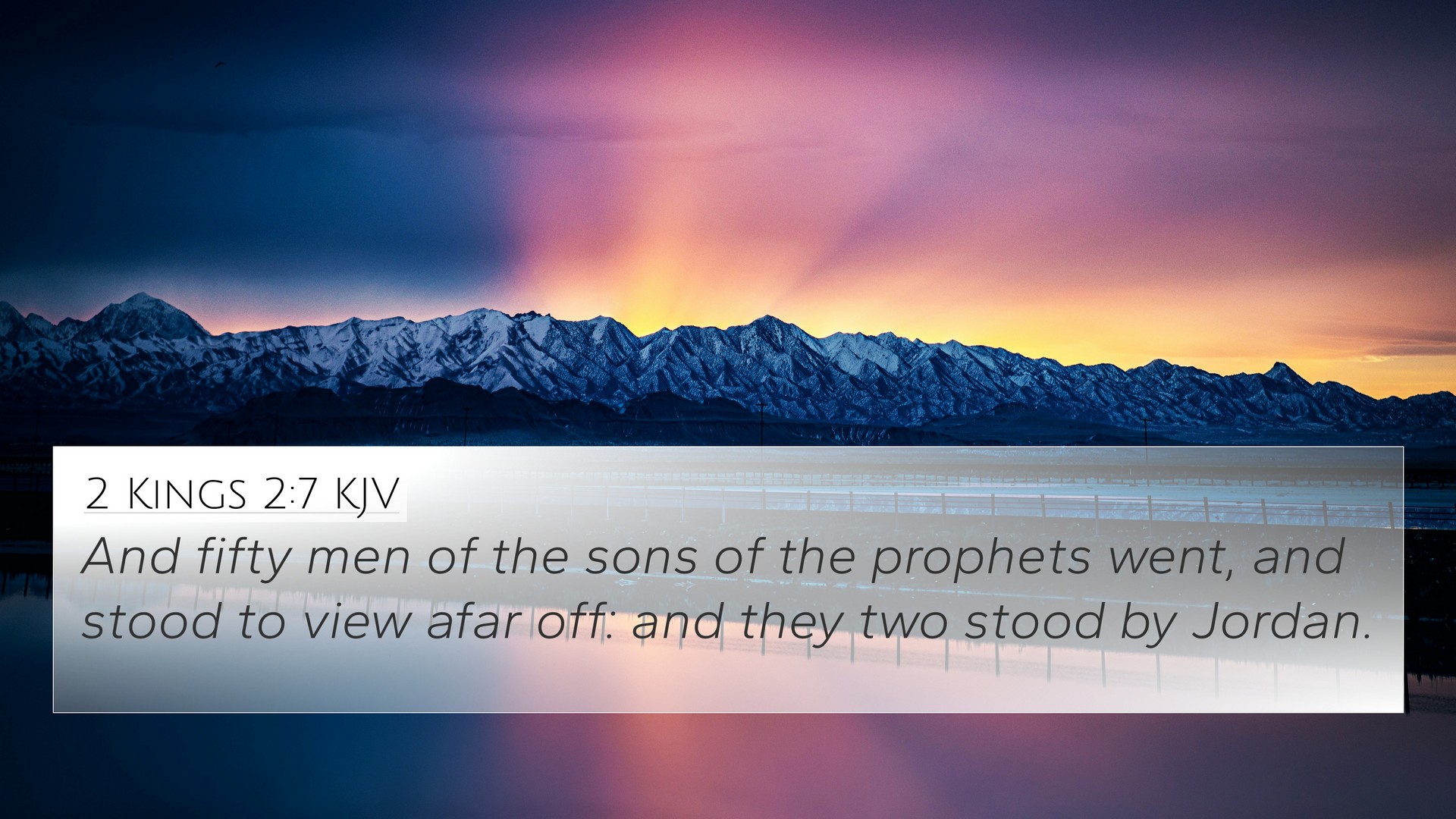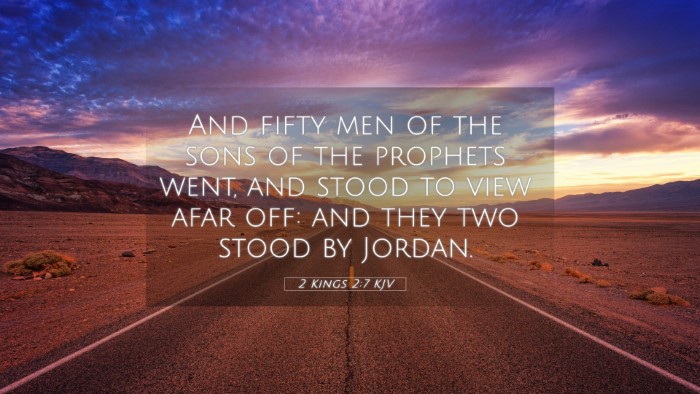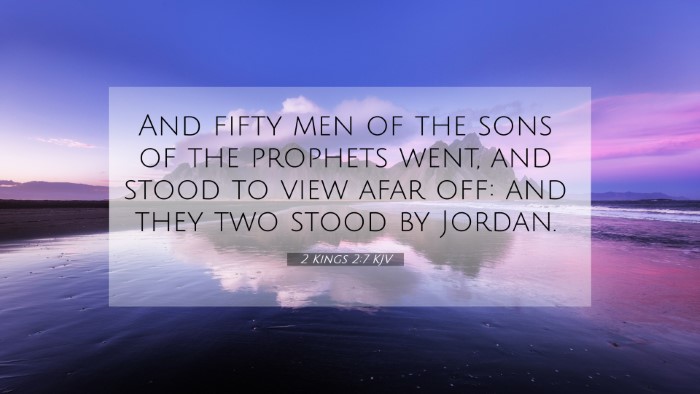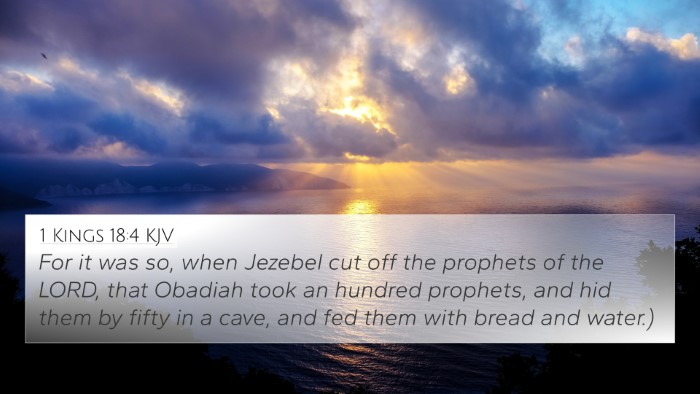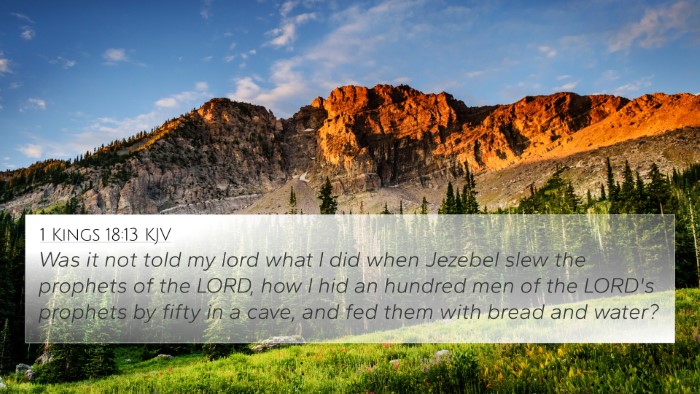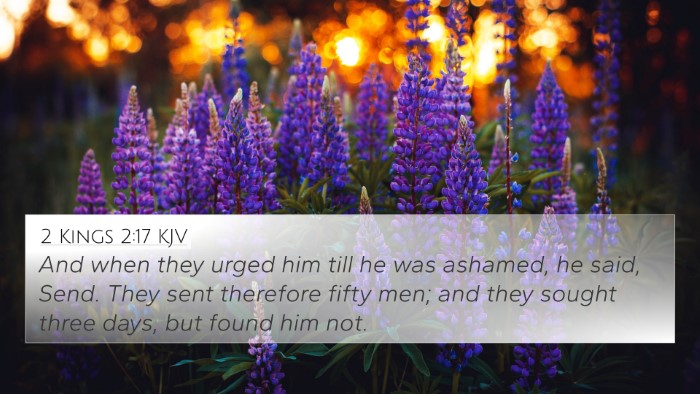Understanding 2 Kings 2:7
Verse: 2 Kings 2:7 - "And fifty men of the sons of the prophets went, and stood to view afar off: and they two stood by Jordan."
This verse captures a pivotal moment in the life of Elisha as he prepares to inherit the prophetic mantle of Elijah. The presence of the fifty sons of the prophets highlights the importance of this transition not only for Elisha but for the prophetic ministry as a whole.
Summary of Insights
Insights from various public domain commentaries emphasize the following themes:
- The Role of the Sons of the Prophets: The sons of the prophets represent a group preparing for prophetic ministry. Their distance indicates both respect for the event and perhaps a sense of their own unworthiness to be directly involved.
- Symbolism of the Jordan: The Jordan River often symbolizes a boundary or a place of transition in biblical narratives and serves as the backdrop for Elijah's departure and Elisha's subsequent calling.
- The Importance of Witnessing: The act of standing afar off allowed the sons of the prophets to witness this profound moment of transference. It underscores the communal aspect of prophetic calling and succession.
- Confirmation of Prophetic Authority: As Elijah is taken into heaven, it solidifies Elisha’s authority and calling as a prophet, marking a significant moment in the continuity of God's work among His people.
Bible Cross-References
2 Kings 2:7 can be cross-referenced with the following verses:
- 1 Kings 19:19: Elijah's call of Elisha as his successor firms up the context for this transition.
- 2 Kings 2:1: The initial description of Elijah's departure sets the stage for the events in verse 7.
- Joshua 3:15-17: The crossing of the Jordan River similarly symbolizes God's guidance and miraculous presence.
- Matthew 28:19-20: The Great Commission parallels the themes of succession and commissioned ministry seen here.
- Acts 1:9-10: The ascension of Jesus can be seen as a parallel event demonstrating the significance of heavenly calling.
- 1 Corinthians 12:28: The role of prophets in the church today reflects ongoing prophetic ministry initiated in the Old Testament.
- Hebrews 11:32-34: The heroes of faith, including prophets, highlight the continued legacy of faithful obedience to God.
Thematic Connections
The connections between Scripture are rich and can be seen clearly when analyzing this passage:
- Leadership Transition: The transition of leadership from Elijah to Elisha can be linked to many other transitions in the Bible, such as Moses to Joshua (Deuteronomy 34:9) and the leadership succession seen in the New Testament.
- Prophetic Ministry: The significance of prophetic ministry is echoed throughout both the Old and New Testaments, establishing a continuous dialogue about God speaking through His chosen messengers.
- Witnessing God's Work: This theme of observing God's miraculous acts reverberates throughout biblical accounts, inviting believers to witness and partake in God's unfolding story (Exodus 14:31).
- Faith and Obedience: The faithful obedience of Elisha, and the sons of the prophets invites reflection on the faithfulness being required of all believers as they respond to God's calling in their lives (2 Kings 2:9-10).
Understanding Through Comparative Analysis
When engaging in comparative Bible verse analysis, the following methods can deepen understanding:
- Use of Bible Concordance: Utilizing a Bible concordance can help identify key terms and themes that connect to 2 Kings 2:7.
- Bible Cross-Reference Guide: Tools designed for cross-referencing biblical texts can aid in exploring thematic connections and narratives.
- Cross-Referencing Bible Study: Engaging in Bible studies that focus on cross-referencing can enrich the understanding of scripture's interconnectivity, allowing for a fuller grasp of biblical theology.
- Identifying Old and New Testament Connections: Examining how the themes of this verse relate to both Old and New Testament teachings can unveil deeper insights into God’s overarching narrative.
Conclusion
2 Kings 2:7 stands as a critical moment in biblical history, illustrating the themes of prophetic succession, the role of witnesses, and God's guiding presence during transitions. By exploring these connections and utilizing cross-reference tools, believers can gain a profound understanding of how this passage contributes to the larger narrative of Scripture.
